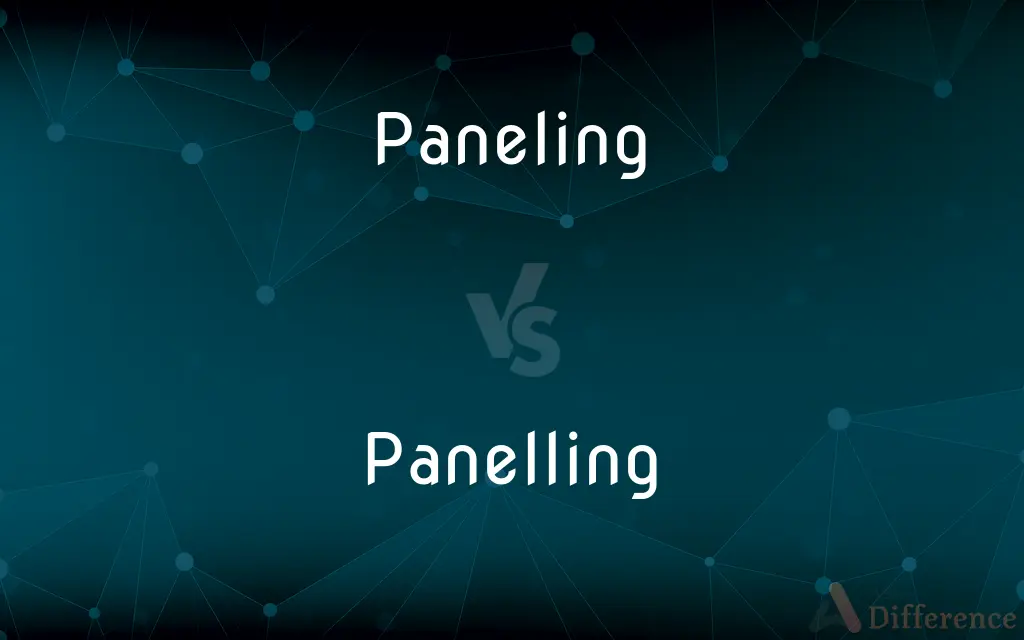Paneling vs. Panelling — What's the Difference?
By Fiza Rafique & Maham Liaqat — Updated on April 3, 2024
Paneling refers to sheets or panels used to cover walls, while panelling is the British spelling of the same term.

Difference Between Paneling and Panelling
Table of Contents
ADVERTISEMENT
Key Differences
Paneling, in American English, denotes the use of panels or sheets of wood or other materials to cover walls, ceilings, or other surfaces in buildings for aesthetic and practical purposes. Panelling, on the other hand, represents the British English spelling of the term, carrying the same meaning and usage but differing in spelling as per the conventions of British English.
While paneling is commonly associated with wood materials, modern variations include synthetic and composite materials that mimic wood's appearance or offer unique textures and colors. Panelling, while the same in application, might be found in a wide range of contexts in British and Commonwealth countries, reflecting local architectural styles and material preferences.
The installation of paneling (or panelling) can greatly alter the look and feel of a room, adding warmth, character, or a modern touch depending on the design and material used. Regardless of the spelling, both terms imply a method of interior decoration that has been popular for centuries, evolving with trends in architecture and design.
Maintenance and care for paneling or panelling depend on the material used. Wood panels may require treatments to preserve their appearance and protect against moisture, while synthetic panels might need regular cleaning to maintain their look.
In literature and product descriptions, the choice between "paneling" and "panelling" often depends on the targeted audience or the standard spelling practices of the publication's country of origin, reflecting the broader differences between American and British English.
ADVERTISEMENT
Comparison Chart
Definition
Sheets or panels used to cover walls.
British spelling of "paneling."
Material
Wood, synthetic, composite.
Same as US, includes wood, synthetic, composite.
Usage
Interior decoration, aesthetic purposes.
Same as US, used in decoration and design.
Maintenance
Depends on material; may require treatments.
Similar maintenance, depending on material.
Spelling Preference
Preferred in American English.
Preferred in British English.
Compare with Definitions
Paneling
Used for aesthetic and practical purposes in interiors.
The cabin's cozy atmosphere was enhanced by its dark wood paneling.
Panelling
Chosen to complement or redefine interior aesthetics.
Light-coloured panelling was selected to contrast with the dark floors.
Paneling
Reflects architectural trends and preferences.
Mid-century modern homes often featured sleek, minimalist paneling.
Panelling
Serves both decorative and practical functions in buildings.
The Victorian house featured ornate oak panelling in the dining room.
Paneling
Requires specific maintenance based on material.
The paneling in the bathroom needed to be treated for moisture resistance.
Panelling
Maintenance varies with the type of material used.
The panelling around the fireplace required regular polishing to maintain its shine.
Paneling
Can be made from various materials, including wood.
Modern paneling options include recyclable synthetic materials.
Panelling
Materials range from traditional wood to modern composites.
For the renovation, they chose eco-friendly bamboo panelling.
Paneling
Popular for its ability to alter the character of spaces.
White paneling was used to brighten and enlarge the appearance of the small room.
Panelling
Influenced by historical and contemporary design movements.
Contemporary designs often incorporate panelling with hidden storage solutions.
Paneling
A section of panels or paneled wall.
Panelling
Panelling (or paneling in the U.S.) is a millwork wall covering constructed from rigid or semi-rigid components. These are traditionally interlocking wood, but could be plastic or other materials.
Paneling
Alternative spelling of panelling
Panelling
A flat, usually rectangular piece forming a raised, recessed, or framed part of the surface in which it is set.
Paneling
(American spelling) panelling
Panelling
The space or section in a fence or railing between two posts.
Paneling
The act or process of forming in panels or decorating with panels.
Panelling
A vertical section of fabric; a gore.
Paneling
The panels which decorate the walls of a room.
Panelling
A thin wooden board, used as a surface for an oil painting.
Paneling
A panel or section of panels in a wall or door
Panelling
A painting on such a board.
Panelling
A board having switches or buttons to control an electric device.
Panelling
An instrument panel.
Panelling
A section of a telephone switchboard.
Panelling
A cartoon drawing in a sequence of cartoons that form a narrative.
Panelling
The complete list of persons summoned for jury duty.
Panelling
Those persons chosen from this list to constitute a pool from which a jury or juries will be selected for a particular court.
Panelling
A jury.
Panelling
A group of people gathered to plan or discuss an issue, judge a contest, or act as a team on a radio or television quiz program.
Panelling
A discussion by such a group.
Panelling
To cover or furnish with panels.
Panelling
To decorate with panels.
Panelling
To separate into panels.
Panelling
(British spelling) The panels with which a surface (especially an indoor wall) is covered, considered collectively.
Panelling
Present participle of panel
Panelling
A panel or section of panels in a wall or door
Common Curiosities
Can paneling/panelling be used in any room?
Yes, it can be used in various rooms but considerations regarding material and moisture resistance are important for areas like bathrooms.
What is paneling/panelling?
Paneling (or panelling) refers to the use of panels to cover walls, ceilings, or other surfaces in buildings primarily for aesthetic reasons.
How does the spelling of paneling/panelling differ?
"Paneling" is the American English spelling, while "panelling" is the British English spelling.
Does paneling/panelling affect the value of a home?
It can, depending on the quality and aesthetic appeal of the paneling/panelling, potentially increasing a home's value.
Is wood the only material used for paneling/panelling?
No, besides wood, materials such as synthetic and composite materials are also used.
How does paneling/panelling influence a room's acoustics?
It can affect acoustics by absorbing sound, reducing echo in a room.
Can paneling/panelling be painted?
Yes, many types of paneling/panelling can be painted to update their look or match interior design changes.
How do you choose the right paneling/panelling?
Consider the room’s function, existing decor, material properties, and maintenance requirements.
Is paneling/panelling expensive?
The cost varies widely based on the material and design, with options available for most budgets.
Are there modern styles of paneling/panelling?
Yes, modern styles range from minimalist designs to panels that mimic textures like stone or fabric.
How do you maintain wood paneling/panelling?
Maintenance typically involves cleaning, treating with protective finishes, and in some cases, polishing to preserve its appearance.
Can paneling/panelling be removed?
Yes, it can be removed, but the process and ease depend on the installation method and materials used.
Can paneling/panelling be installed over existing walls?
Yes, it is often installed over existing walls to enhance the interior decor or hide imperfections.
Can paneling/panelling improve insulation?
Some types can add an extra layer of insulation, helping to retain heat and reduce noise.
Is paneling/panelling suitable for DIY installation?
Many types are designed for easy installation, making them suitable for DIY projects.
Share Your Discovery

Previous Comparison
Resalable vs. Resaleable
Next Comparison
Cunning vs. EngineAuthor Spotlight
Written by
Fiza RafiqueFiza Rafique is a skilled content writer at AskDifference.com, where she meticulously refines and enhances written pieces. Drawing from her vast editorial expertise, Fiza ensures clarity, accuracy, and precision in every article. Passionate about language, she continually seeks to elevate the quality of content for readers worldwide.
Co-written by
Maham Liaqat














































